广东省汕头市2016高考英语二轮复习 阅读理解练习(1)
- 格式:doc
- 大小:162.50 KB
- 文档页数:12
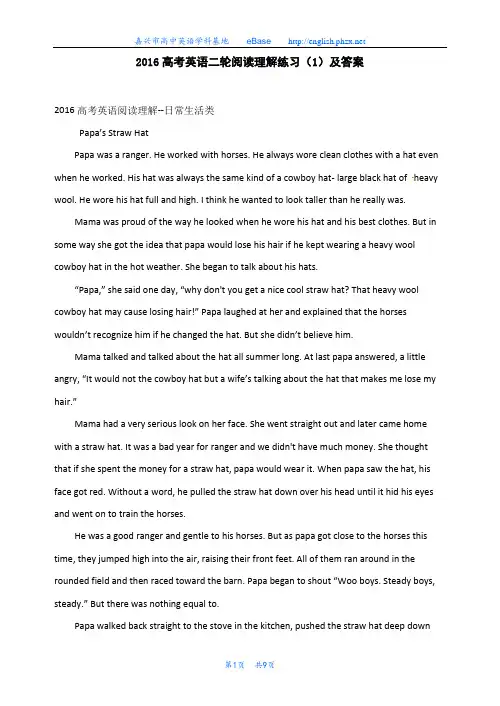
2016高考英语二轮阅读理解练习(1)及答案2016高考英语阅读理解--日常生活类Papa’s Straw HatPapa was a ranger. He worked with horses. He always wore clean clothes with a hat even when he worked. His hat was always the same kind of a cowboy hat- large black hat of heavy wool. He wore his hat full and high. I think he wanted to look taller than he really was.Mama was proud of the way he looked when he wore his hat and his best clothes. But in some way she got the idea that papa would lose his hair if he kept wearing a heavy wool cowboy hat in the hot weather. She began to talk about his hats.“Papa,” she said one day, “why don't you get a nice cool straw hat? That heavy wool cowboy hat may cause losing hair!” Papa laughed at her and explained that the horses wouldn’t recognize him if he changed the hat. But she didn’t believe him.Mama talked and talked about the hat all summer long. At last papa answered, a little angry, “It would not the cowboy hat but a wife’s talking about the hat that makes me lose my hair.”Mama had a very serious look on her face. She went straight out and later came home with a straw hat. It was a bad year for ranger and we didn't have much money. She thought that if she spent the money for a straw hat, papa would wear it. When papa saw the hat, his face got red. Without a word, he pulled the straw hat down over his head until it hid his eyes and went on to train the horses.He was a good ranger and gentle to his horses. But as papa got close to the horses this time, they jumped high into the air, raising their front feet. All of them ran around in the rounded field and then raced toward the barn. Papa began to shout “Woo boys. Steady boys, steady.” But there was nothing equal to.Papa walked back straight to the stove in the kitchen, pushed the straw hat deep downinto the fire then turned to mama, in a way that even frightened me. “Now listen to me, mama. Understand this I will never wear a straw hat or any other kind of hat my horses do not like.” Then he put on his wool cowboy hat and walked out of the house.I never heard mama talk any more about hats. Perhaps, that is why when papa died many years later, there was a round spot on the top of his head where there was no hair.【小题1】According to the passage, a ranger is _______.A.a person wearing a woolen hatB.a position requiring clean clothesC.a person training horses for some purposeD.a person riding a carriage with horses【小题2】Mama bought papa a straw hat because _______.A.most cowboys preferred to wear itB.she was worried about his healthC.a woolen one didn’t suit papaD.it was cheap and she could save money【小题3】What quality can we learn from papa?A.Gentle. B.Patient. C.Committed. D.Modest.【小题4】It can be learned from the story that _______.A.this family were not rich but diligentB.papa didn’t love the straw hat and mamaC.protecting hair was very importantD.a cowboy hat was useful on farming阅读理解。
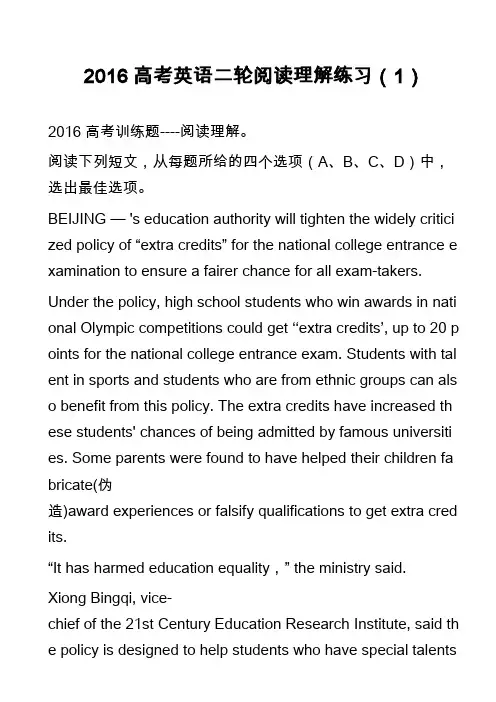
2016高考英语二轮阅读理解练习(1)2016高考训练题----阅读理解。
阅读下列短文,从每题所给的四个选项(A、B、C、D)中,选出最佳选项。
BEIJING — 's education authority will tighten the widely critici zed policy of “extra credits” for the national college entrance e xamination to ensure a fairer chance for all exam-takers. Under the policy, high school students who win awards in nati onal Olympic competitions could get ‘‘extra credits’, up to 20 p oints for the national college entrance exam. Students with tal ent in sports and students who are from ethnic groups can als o benefit from this policy. The extra credits have increased th ese students' chances of being admitted by famous universiti es. Some parents were found to have helped their children fa bricate(伪造)award experiences or falsify qualifications to get extra cred its.“It has harmed education equality,” the ministry said.Xiong Bingqi, vice-chief of the 21st Century Education Research Institute, said th e policy is designed to help students who have special talentsbut may be weak in academic performance to have a chance to receive higher education. It will still be needed but it is time to make the rules fairer," he said.The ministry said it will reduce the range of competitions whos e winners can get extra credits, and limit the winners, privileg es.The new policy will apply to students who begin high school in 2011, it said.Chen Lei, a mother of a 10-year-old girl, said she welcomed the ministry's policy adjustment as she does not want her daughter to become an Olympic comp etition geek.But not all the Chinese parents welcomed the new policy. “It i s like a thunderbolt for me. My 13-year-old son has spent so much time studying Olympic math, and participated in so many technological competitions during vac ations. It is useless now,” said Dong Wen, a 43-year-old mother.A student said, “Many students have changed the current stu dy plan, and they can abandon the competition. I will be intere sted in learning the courses which can improve my abilities.”Yuan Guiren, minister of education, told China Daily that the r eform is an attempt to consider the overall quality of an applicant. “But the country will not stop the national college entranc e examination as it is still the most objective way to evaluate t alent in China,” he said.5. It can be inferred from the passage that_____.A. high school students with talent in sports are weak in acad emic performanceB. students who win awards in Olympic competitions can't get extra credits in 2011C. the number of competitions whose winners can be awarde d extra credits will be smallerD. he extra credits have reduced students' chances of being a dmitted by famous colleges6. What does the underlined word “geek” probably mean?A. a winnerB. a smart learnerC. a competitorD. a dull student7.Which person in the passage was strongly against the new po licy?A. Xiong BingqiB. Chen LeiC. Dong WenD. Yuan Guiren8. What might be the best title for the text?A. “Extra credits” policy in to be adjustedB. Promotion of national Olympic competitionsC. Advice on the national college entrance examD. Chinese government to push education reform参考答案5-8CDCA阅读下列短文,从每题所给的A.B.C和D项中,选出最佳选项。
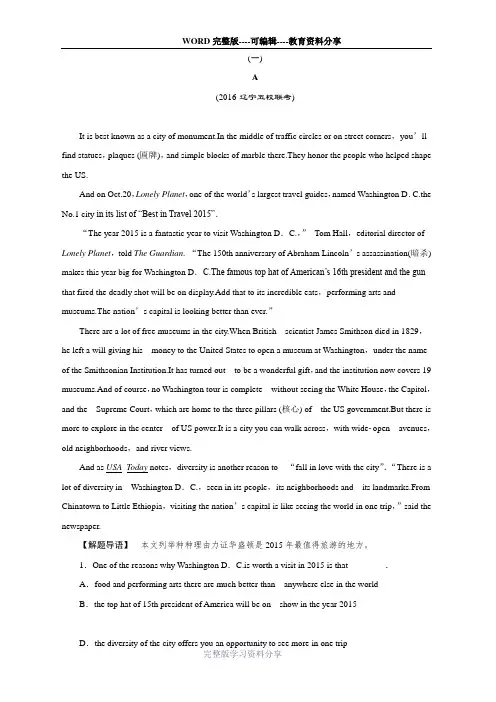
(一)A(2016·辽宁五校联考)It is best known as a city of monument.In the middle of traffic circles or on street corners,you’ll find statues,plaques (匾牌),and simple blocks of marble there.They honor the people who helped shape the US.And on Oct.20,Lonely Planet,one of the world’s largest travel guides,named Washington D.C.the No.1 city in its list of “Best in Travel 2015”.“The year 2015 is a fantastic year to visit Washington D.C.,”Tom Hall,editorial director of Lonely Planet,told The Guardian. “The 150th anniversary of Abraham Lincoln’s assassination(暗杀) makes this year big for Washington D.C.The famous top hat of American’s 16th president and the gun that fired the deadly shot will be on display.Add that to its incredible eats,performing arts and museums.The nation’s capital is looking better than ever.”There are a lot of free museums in the city.When British scientist James Smithson died in 1829,he left a will giving his money to the United States to open a museum at Washington,under the name of the Smithsonian Institution.It has turned out to be a wonderful gift,and the institution now covers 19 museums.And of course,no Washington tour is complete without seeing the White House,the Capitol,and the Supreme Court,which are home to the three pillars (核心) of the US government.But there is more to explore in the center of US power.It is a city you can walk across,with wideopen avenues,old neighborhoods,and river views.And as USA_Today notes,diversity is another reason to “fall in love with the city”.“There is a lot of diversity in Washington D.C.,seen in its people,its neighborhoods and its landmarks.From Chinatown to Little Ethiopia,visiting the nation’s capital is like seeing the world in one trip,”said the newspaper.【解题导语】本文列举种种理由力证华盛顿是2015年最值得旅游的地方。
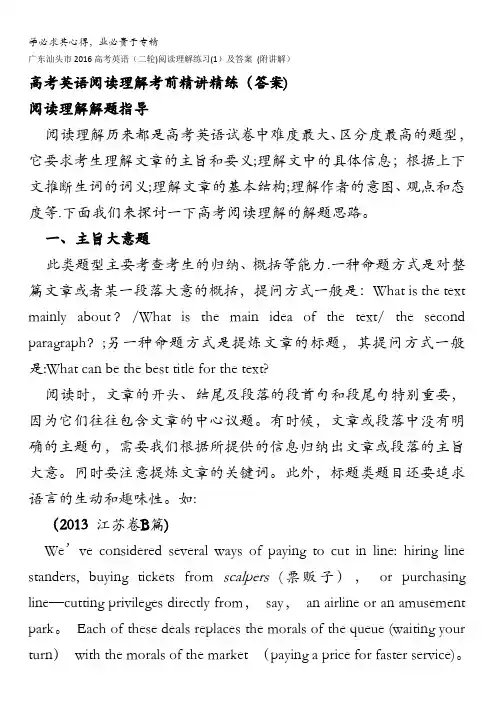
广东汕头市2016高考英语(二轮)阅读理解练习(1)及答案(附讲解)高考英语阅读理解考前精讲精练(答案)阅读理解解题指导阅读理解历来都是高考英语试卷中难度最大、区分度最高的题型,它要求考生理解文章的主旨和要义;理解文中的具体信息;根据上下文推断生词的词义;理解文章的基本结构;理解作者的意图、观点和态度等.下面我们来探讨一下高考阅读理解的解题思路。
一、主旨大意题此类题型主要考查考生的归纳、概括等能力.一种命题方式是对整篇文章或者某一段落大意的概括,提问方式一般是:What is the text mainly about?/What is the main idea of the text/ the second paragraph?;另一种命题方式是提炼文章的标题,其提问方式一般是:What can be the best title for the text?阅读时,文章的开头、结尾及段落的段首句和段尾句特别重要,因为它们往往包含文章的中心议题。
有时候,文章或段落中没有明确的主题句,需要我们根据所提供的信息归纳出文章或段落的主旨大意。
同时要注意提炼文章的关键词。
此外,标题类题目还要追求语言的生动和趣味性。
如:(2013 江苏卷B篇)We’ve considered several ways of paying to cut in line: hiring line standers, buying tickets from scalpers (票贩子),or purchasing line—cutting privileges directly from,say,an airline or an amusement park。
Each of these deals replaces the morals of the queue (waiting your turn)with the morals of the market (paying a price for faster service)。
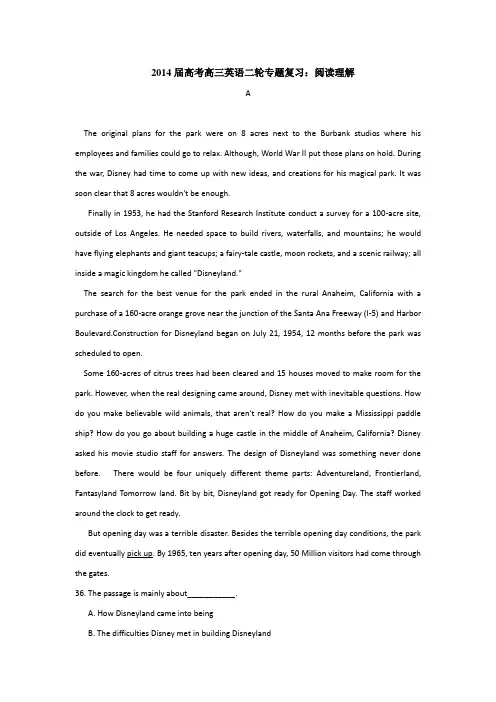
2014届高考高三英语二轮专题复习:阅读理解AThe original plans for the park were on 8 acres next to the Burbank studios where his employees and families could go to relax. Although, World War II put those plans on hold. During the war, Disney had time to come up with new ideas, and creations for his magical park. It was soon clear that 8 acres wouldn't be enough.Finally in 1953, he had the Stanford Research Institute conduct a survey for a 100-acre site, outside of Los Angeles. He needed space to build rivers, waterfalls, and mountains; he would have flying elephants and giant teacups; a fairy-tale castle, moon rockets, and a scenic railway; all inside a magic kingdom he called "Disneyland."The search for the best venue for the park ended in the rural Anaheim, California with a purchase of a 160-acre orange grove near the junction of the Santa Ana Freeway (I-5) and Harbor Boulevard.Construction for Disneyland began on July 21, 1954, 12 months before the park was scheduled to open.Some 160-acres of citrus trees had been cleared and 15 houses moved to make room for the park. However, when the real designing came around, Disney met with inevitable questions. How do you make believable wild animals, that aren't real? How do you make a Mississippi paddle ship? How do you go about building a huge castle in the middle of Anaheim, California? Disney asked his movie studio staff for answers. The design of Disneyland was something never done before. There would be four uniquely different theme parts: Adventureland, Frontierland, Fantasyland Tomorrow land. Bit by bit, Disneyland got ready for Opening Day. The staff worked around the clock to get ready.But opening day was a terrible disaster. Besides the terrible opening day conditions, the park did eventually pick up. By 1965, ten years after opening day, 50 Million visitors had come through the gates.36. The passage is mainly about___________.A. How Disneyland came into beingB. The difficulties Disney met in building DisneylandC. What visitors can enjoy in Disneyland.D. A brief introduction to Disneyland37. Which of the following dates would probably be the opening date of Disneyland?A. 1953B. 1954C. 1955D. 196538. Which of the following statements is Not True?A. World War II had some influence on the building plan of the Disneyland.B. Disney must have met many difficulties in building Disneyland.C. Disney was a great man with great imagination and creativity.D. About 50 million visitors have visited Disneyland so far.39. The underlined phrase in the last paragraph probably means _________.A. collectB. improveC. findD. openBTODAY, Friday, November 12JAZZ with the Mike Thomas Jazz Band at The Derby Arms. Upper Richmond Road West, Sheen.DISCO Satin Sounds Disco. Free at The Lord Napier, Mort lake High St., from 8a. m. to 8p. m. Tel: 682—1158.SATURDAY, November 13JAZZ Lysis at The Bull’s Head, Barnes. Admission 60p.MUSICAL HALL at The Star and Garter, Lower Richmond Road, Putney, provided by the Aba Daba Music Hall company. Good food and entertainment fair price. Tel: 789—6749.FAMILY night out? Join the sing-along at The Black Horse. Sheen Road, Richmond.JAZZ The John Bennett Big Band at The Bu ll’s Head, Barnes. Admission 80p.THE DERBY ARMS, Upper Richmond Road West, give you Joe on the electric accordion(手风琴). Tel: 789—4536SUNDAY, November 14DISCO Satin Sounds Disco, free at The Lord Napier, Mort Lake High Street, from 8 a. m. to 8 p. m. FOLK MUSIC at The Derby Arms. The Short Stuff and residents the Norman Chop Trio. Non-remembers 70p. Tel: 688—4626.HEAVY MUSIC with Tony Simon at The Bull, Upper Richmond Road West, East Sheen.THE DERBY ARMS, Upper Richmond Road West, give you Joe on the electric accordion.40. Where and when can you hear the Norman Chop Trio?A. At the Derby Arms on Sunday.B. At the Bull’s Head on Sunday.C. At the Bull on Saturday.D. At the Black Horse on Saturday.41. You want to enjoy the electric accordion on Saturday. Which telephone number do you have to ring to find out what time it starts?A. 789—6749.B. 789—4536.C. 682—1158.D. 688—4626.42.You want to spend the Saturday by joining the entertainment with your family.Where should you go?A. Disco at The Lord Napier.B. Jazz at The Bull’s HeadC. The electric accordion at The Derby Arms.D. The sing-along at The Black Horse.. CPeople do not analyze every problem they meet. Sometimes they try to remember a solution from the last time they had a similar problem. They often accept the opinions or ideas of other people. Other times they begin to act without thinking. They try to find a solution by trial and error. However, when all these methods fail, the person with a problem has to start analyzing. There are six stages in analyzing a problem.First the person must recognize that there is a problem. For example, Sam’s bicycle is broken, and he cannot ride it to class as he usually does. Sam must see that there is a problem with his bicycle.Next the thinker must define the problem. Before Sam can repair his bicycle, he must find out the reason why it does not work. For instance, he must determine if the problem is with the gears, the brakes, or the frame. He must make his problem more specific.Now the person must look for information that will make the problem clearer and lead to possible solutions. For instance, suppose Sam decided that his bike does not work because there is something wrong with the gear wheels. At this time, he can look in his bicycle repair book and read about gears. He can talk to his friends at the bike shop. He can look at his gears carefully. After studying the problem, the person should have several suggestions for a possible solution. Take Sam as an illustration. His suggestions might be: put oil on the gear wheels; buy new gear wheels and replace the old ones; tighten or loosen the gear wheels.Eventually one suggestion seems to be the solution to the problem. Sometimes the final idea comes very suddenly because the thinker suddenly sees something new or sees something in a new way. Sam, for example, suddenly sees that there is a piece of chewing gum between the gear wheels. He immediately realizes the solution to his problem: he must clean the gear wheels.Finally the solution is tested. Sam cleans the gear wheels and finds that afterwards his bicycle works perfectly. In short , he has solved the problem.43. By referring to Sam’s broken bicycl e, the author intends to _________.A. illustrate the ways to repair his bicycleB. discuss the problems of his bicycleC. tell us how to solve a problemD. show us how to analyze a problem44. Which of the following is NOT true?A. People do not analyze the problem they meet.B. People often accept the opinions or ideas of other people.C. People may learn from their past experience.D. People can not solve some problems they meet.45. As used in the last sentence, the phrase “in short” means _________.A. in the short termB. in detailC. in a wordD. in the end46. . In analyzing a problem we should do all the following except .A. recognize and define the problemB. look for information to make the problem clearerC. have suggestions for a possible solutionD. find a solution by trial or mistakeDThe campaign is over. The celebrations have ended. And the work for US president-elect Barack Obama has begun.The 47-year-old politician rose to the highest post because of his stand against the war in Iraq and his plans to fix a weak economy. But what will the first 47-year-old African-American president do for race relations?Obama’s victory appears to have given blacks and other minorities a true national role model. For years, many looked to athletes and musicians for inspiration. As Darius Turner, an African-American high school student in Los Angeles, told the Los Angeles Times, “Kobe doesn’t have to be e verybody’s role model anymore.”Recent polls(民意测验)also suggest that Obama’s victory has given Americans new optimism about race relations. For example, a USA Today poll found that two-thirds of Americans believe relations between blacks and whites “will finally be worked out”. This is the most hopeful response since the question was first asked during the civil rights revolution in 1963.However, it’s still too early to tell whether Obama’s presidency will begin to solve many of the social problems facing low-income black communities.Although blacks make up only 13 percent of the US population, 55 percent of all prisoners are African-American. Such numbers can be blamed on any number of factors on America’s racist past, a failure of government policy and the collapse(瓦解)of the family unit in black communities.It is unlikely that Obama will be able to reverse (扭转) such trends overnight. However, Bill Bank, an expert of African-American Studies, says that eventually young blacks need to find role models in their own communities. “That’s not Martin Luther King, and not Barack Obama,” he told the Los Angeles Times. “It’s actually the people closest to them. Barack only has so much influence.”In the opinion of black British politician Trevor Phi llips, Obama’s rise will contribute more to multiculturalism than to race relations in the US.“When the G8 meets, the four most important people in the room will be the president of China, the prime minister of India, the prime minister of Japan and Ba rak Obama,” he told London’s The Times newspaper. “It will be the first time we’ve seen that on our television screens. That will be a huge psychological shift (心理转变) for both the white people and the colored ones in the world.”47. For years, before Obama was elected president of the US, __________.A. Kobe was the only role model for all the blacksB. blacks could only find role models on the basketball courtC. minorities in America couldn’t find role models in their real lifeD. American blacks had no role model who was successful in political area48. According to Bill Bank, ____________.A. it’s better for young blacks to find role models in those who are close to themB. young blacks should not be so much influenced by ObamaC. blacks should find other role models because Obama is far from their realityD. Obama is not the proper role model for African-Americans49. What would be the best title for this passage?A. The First African-American PresidentB. America’s New R ole ModelC. Obama-- A Successful Black .D. Choosing a Right Role Model50. What will be the huge psychological shift Trevor mentioned at the end of the passage?A. The other three leaders all support Obama.B. Obama is an African-American president.C. None of the four leaders is white.D. The other three leaders except Obama are from Asian countries.A. ACDBB. ABDC. CACDD. DABCEHappy birthdayThe China National Opera (CNO) will give a concert to celebrate its 50th birthday .Different generations of CNO vocalists , like Li Guangxi , Yao Hong and Ma Mei , will present the concert which will feature both songs from famous Chinese operas like “The White-haired Girl” and “The Hundredth Bride”, as well as , arias of such Western opera classics as “Madame Butterfly”, “La Traviata” and “Rigoletto”.Time/ date: 7:30 pm , September 7, 8Location : Tianqiao TheatreTel : 6551-4787, 8315-6170Tickets : 60—500 yuan (US $7.2— 60.2)Folk musicA concert will be held to feature some recently composed traditional Chinese music works .The concert , given by the Folk Orchestra of the China Opera and Ballet Theatre , will include such pieces as “Memory of Childhood ”, “Memorial Ceremony for God ”and “Wine Song”.Time/date: 7:30pm, September 13Location: Concert hall at the National Library of ChinaTel: 6848 –5462, 6841-9220Tickets: 30-200 yuan (US$3.6-24.1)Moon musicA concert of traditional Chinese music will be given on the eve of the Moon Festival which falls on September 21st this year.The concert will feature a number of famous pieces centred on the theme of the moon, such as “Moonlight”, “Spring night on a Moonlit River” and “Lofty Mountain and Flowing River.”A number of established traditional Chinese music performers like Zhou Yaokun and Fan Weiqing, will play solos as well as collaborate with the folk music orchestra.Time / date: 7:30 pm, September 21stLocation: Grand Theatre of the Cultural Palace of NationalitiesTel: 6606—8888, 6606—999958.If you want to buy tickets for listening to the music “Memory of Childhood”, you will dial __.A.6551—4787 B.6848—5462 C.8315—6170 D.6606—999959.Which statement is right according to the passage?A.Li Guangxi, Yao Hong and Ma Mei stand for the same generation of CNO vocalists.B.“Rigoletto” is a famous piece on the theme of the moon.C.“Lofty Mountain and Flowing River” is a traditional Chinese music.D.Zhou Yaokun will play solos and Fan Weiqing will collaborate with the folk music orchestra.60.“Madame Butterfly” is .A.a Chinese opera B.a Western opera C a piece of music D.a song61.In which column of a newspaper will the article be published?A.Entertainment. B.People. C.Culture. D.Sports.以下是附加文档,不需要的朋友下载后删除,谢谢班主任工作总结专题8篇第一篇:班主任工作总结小学班主任特别是一年级的班主任,是一个复合性角色。
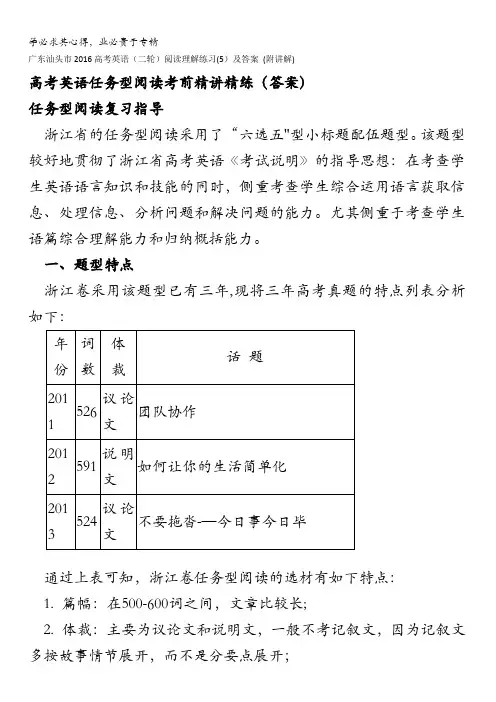
广东汕头市2016高考英语(二轮)阅读理解练习(5)及答案(附讲解)高考英语任务型阅读考前精讲精练(答案)任务型阅读复习指导浙江省的任务型阅读采用了“六选五"型小标题配伍题型。
该题型较好地贯彻了浙江省高考英语《考试说明》的指导思想:在考查学生英语语言知识和技能的同时,侧重考查学生综合运用语言获取信息、处理信息、分析问题和解决问题的能力。
尤其侧重于考查学生语篇综合理解能力和归纳概括能力。
一、题型特点浙江卷采用该题型已有三年,现将三年高考真题的特点列表分析如下:通过上表可知,浙江卷任务型阅读的选材有如下特点:1. 篇幅:在500-600词之间,文章比较长;2. 体裁:主要为议论文和说明文,一般不考记叙文,因为记叙文多按故事情节展开,而不是分要点展开;3。
话题:话题贴近学生生活,时代感强。
常见的话题有:日常生活、学生生活、学习方法与技巧、环境保护、人际关系、科普知识等;4. 文章结构:所选文章多为“总—-分”型,即:文章一般由两大部分组成:引子+正文,正文部分则由五个部分组成,每个部分均由“小标题+说明"组成,各部分的说明是对小标题的阐释或论证。
需要特别说明的是,2013年该题型为选择每段的首句,而不再是子标题.其实,各段首句也就是本段主题句,相当于本段落的子标题。
二、真题实例分析2013年高考英语浙江卷下面文章中有5个段落需要添加首句(第61~65题)。
请从以下选项(A、B、C、D、E和F)选出适合各段落的首句.选项中有一项是多余选项。
A. Time can run out。
B. Tomorrow won't be better。
C. Ideas need time to develop。
D。
Your professor will be impatient.E. You blow off your chances for help.F. You are probably overestimating (高估) the pain。
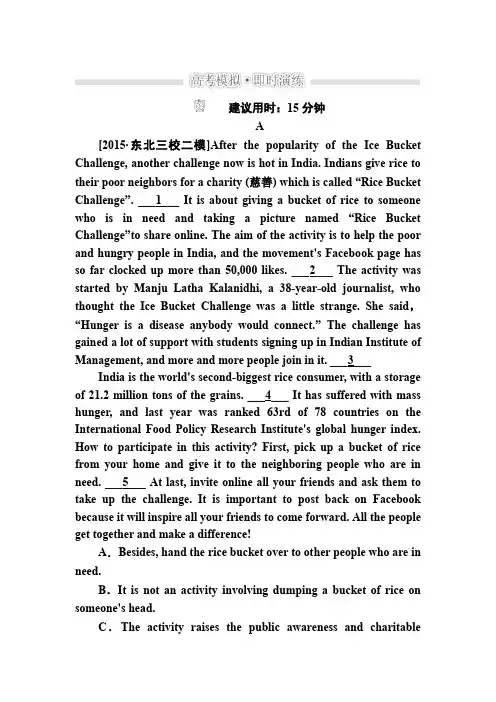
建议用时:15分钟A[2015·东北三校二模]After the popularity of the Ice Bucket Challenge, another challenge now is hot in India. Indians give rice to their poor neighbors for a charity (慈善) which is called “Ri ce Bucket Challenge”. ___1___ It is about giving a bucket of rice to someone who is in need and taking a picture named “Rice Bucket Challenge”to share online. The aim of the activity is to help the poor and hungry people in India, and the movement's Facebook page has so far clocked up more than 50,000 likes. ___2___ The activity was started by Manju Latha Kalanidhi, a 38-year-old journalist, who thought the Ice Bucket Challenge was a little strange. She said,“Hunger is a disease anybody would connect.” The challenge has gained a lot of support with students signing up in Indian Institute of Management, and more and more people join in it. ___3___ India is the world's second-biggest rice consumer, with a storage of 21.2 million tons of the grains. ___4___ It has suffered with mass hunger, and last year was ranked 63rd of 78 countries on the International Food Policy Research Institute's global hunger index. How to participate in this activity? First, pick up a bucket of rice from your home and give it to the neighboring people who are in need. ___5___ At last, invite online all your friends and ask them to take up the challenge. It is important to post back on Facebook because it will inspire all your friends to come forward. All the people get together and make a difference!A.Besides, hand the rice bucket over to other people who are in need.B.It is not an activity involving dumping a bucket of rice on someone's head.C.The activity raises the public awareness and charitabledonations to agriculture.D.The Air Asia India airline says its staff including senior management will join.E.Then, take a picture and post it on facebook with “Rice Bucket Challenge”.F.But it is far from enough for this country.G.The initial inspiration came from the ice bucket challenge.本文讲述的是关于当前在印度盛行的“米桶挑战”慈善活动以及活动的目的。
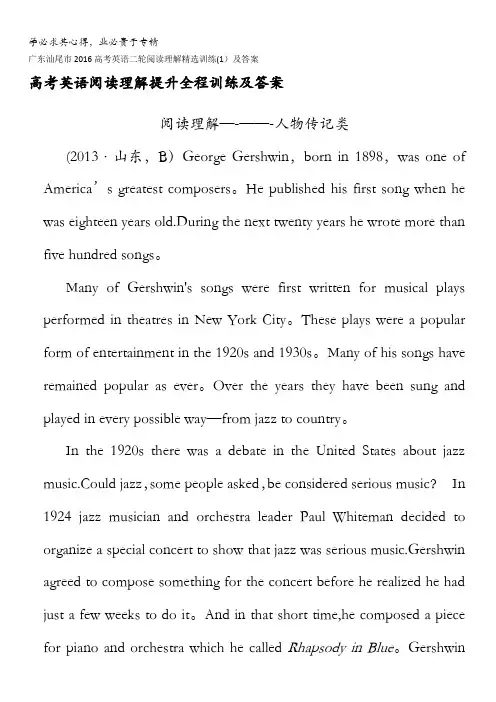
广东汕尾市2016高考英语二轮阅读理解精选训练(1)及答案高考英语阅读理解提升全程训练及答案阅读理解—-——-人物传记类(2013·山东,B)George Gershwin,born in 1898,was one of America’s greatest composers。
He published his first song when he was eighteen years old.During the next twenty years he wrote more than five hundred songs。
Many of Gershwin's songs were first written for musical plays performed in theatres in New York City。
These plays were a popular form of entertainment in the 1920s and 1930s。
Many of his songs have remained popular as ever。
Over the years they have been sung and played in every possible way—from jazz to country。
In the 1920s there was a debate in the United States about jazz music.Could jazz,some people asked,be considered serious music?In 1924 jazz musician and orchestra leader Paul Whiteman decided to organize a special concert to show that jazz was serious music.Gershwin agreed to compose something for the concert before he realized he had just a few weeks to do it。
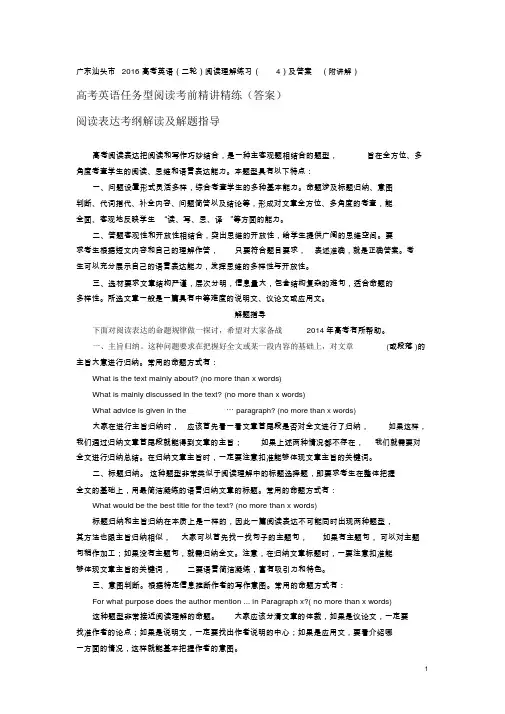
广东汕头市2016 高考英语(二轮)阅读理解练习(4)及答案(附讲解)高考英语任务型阅读考前精讲精练(答案)阅读表达考纲解读及解题指导高考阅读表达把阅读和写作巧妙结合,是一种主客观题相结合的题型,旨在全方位、多角度考查学生的阅读、思维和语言表达能力。
本题型具有以下特点:一、问题设置形式灵活多样,综合考查学生的多种基本能力。
命题涉及标题归纳、意图判断、代词指代、补全内容、问题简答以及结论等,形成对文章全方位、多角度的考查,能全面、客观地反映学生“读、写、思、译”等方面的能力。
二、答题客观性和开放性相结合,突出思维的开放性,给学生提供广阔的思维空间。
要求考生根据短文内容和自己的理解作答,只要符合题目要求,表述准确,就是正确答案。
考生可以充分展示自己的语言表达能力,发挥思维的多样性与开放性。
三、选材要求文章结构严谨,层次分明,信息量大,包含结构复杂的难句,适合命题的多样性。
所选文章一般是一篇具有中等难度的说明文、议论文或应用文。
解题指导下面对阅读表达的命题规律做一探讨,希望对大家备战2014年高考有所帮助。
一、主旨归纳。
这种问题要求在把握好全文或某一段内容的基础上,对文章(或段落 )的主旨大意进行归纳。
常用的命题方式有:What is the text mainly about? (no more than x words)What is mainly discussed in the text? (no more than x words)What advice is given in the⋯paragraph? (no more than x words)大家在进行主旨归纳时,应该首先看一看文章首尾段是否对全文进行了归纳,如果这样,我们通过归纳文章首尾段就能得到文章的主旨;如果上述两种情况都不存在,我们就需要对全文进行归纳总结。
在归纳文章主旨时,一定要注意扣准能够体现文章主旨的关键词。
二、标题归纳。
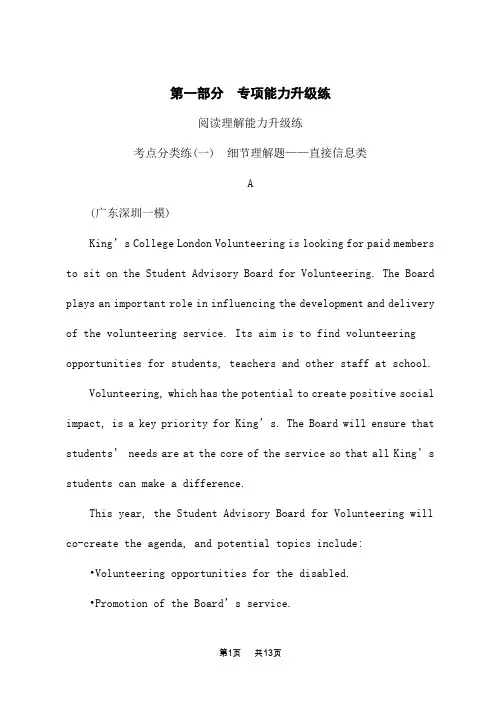
第一部分专项能力升级练阅读理解能力升级练考点分类练(一) 细节理解题——直接信息类A(广东深圳一模)King’s College London Volunteering is looking for paid members to sit on the Student Advisory Board for Volunteering. The Board plays an important role in influencing the development and delivery of the volunteering service. Its aim is to find volunteering opportunities for students, teachers and other staff at school.Volunteering, which has the potential to create positive social impact, is a key priority for King’s. The Board will ensure that stude nts’ needs are at the core of the service so that all King’s students can make a difference.This year, the Student Advisory Board for Volunteering will co-create the agenda, and potential topics include:•Volunteering opportunities for the disabled.•Promotion of the Board’s service.•How to recognise and reward volunteers.•Evaluation of the Board’s work.This is a unique and exciting opportunity open to all studying at King’s, regardless of how much or how little you have volunteered. The Board will be run both online and in-person, and its members will be paid the London Living Wage (£11.95 per hour).The application deadline is 23:59 on Friday.Apply via the form below, using your King’s email address.1.WhatdoestheBoardaimtodoforthoseatKing’s?A.Perform voluntary work.B.Meet their academic needs.C.Provide learning opportunities.D.Discover volunteering chances.2.Which of the following is a possible topic for this year’s agenda?A.Running the Board online.B.Training voluntary workers.C.Assessing the Board’s performance.D.Taking care of people with disabilities.3.WhocanapplytobeamemberoftheBoardatKing’s?A.The students.B.The teachers.C.The graduates.D.The working staff.B(新高考Ⅰ卷)Like most of us, I try to be mindful of food that goes to waste. The arugula(芝麻菜) was to make a nice green salad, rounding out a roast chicken dinner. But I ended up working late. Then friends called with a dinner invitation. I stuck the chicken in the freezer. But as days passed, the arugula went bad. Even worse, I had unthinkingly bought way too much;I could have made six salads with what I threw out.In a world where nearly 800 million people a year go hungry, “food waste goes against the moral grain, ” as Elizabeth Royte writes in this month’s cover story. It’s jaw-dropping how muchperfectly good food is thrown away—from “ugly” (but quite eatable) vegetables rejected by grocers to large amounts of uneaten dishes thrown into restaurant garbage cans.Producing food that no one eats wastes the water, fuel, and other resources used to grow it. That makes food waste an environmental problem. In fact, Royte writes, “if food waste were a country, it would be the third largest producer of greenhouse gases in the world.”If that’s hard to understand, let’s keep it as simple as t he arugula at the back of my refrigerator. Mike Curtin sees my arugula story all the time—but for him, it’s more like 12 boxes of donated strawberries nearing their last days. Curtin is CEO of DC Central Kitchen in Washington, D.C., which recovers food and turns it into healthy meals. Last year it recovered more than 807,500 pounds of food by taking donations and collecting blemished(有瑕疵的) produce that otherwise would have rotted in fields. And the strawberries?Volunteers will wash, cut, and freeze or dry them for use in meals down the road.Such methods seem obvious, yet so often we just don’t think.“Everyone can play a part in reducing waste, whether by not purchasing more food than necessary in your weekly shopping or by asking restaurants to not include the side dish you won’t eat,” Curtin says.4.What does the author want to show by telling the arugula story?A.We pay little attention to food waste.B.We waste food unintentionally at times.C.We waste more vegetables than meat.D.We have good reasons for wasting food.5.What is a consequence of food waste according to the teental harm.C.Energy shortage.D.Worldwide starvation.6.WhatdoesCurtin’scompanydo?A.It produces kitchen equipment.B.It turns rotten arugula into clean fuel.C.It helps local farmers grow fruits.D.It makes meals out of unwanted food.7.What does Curtin suggest people do?A.Buy only what is needed.B.Reduce food consumption.C.Go shopping once a week.D.Eat in restaurants less often.C(全国甲卷)WheretoEatinBangkokBangkok is a highly desirable destination for food lovers. It has a seemingly bottomless well of dining options.Here are some suggestions on where to start your Bangkok eating adventure. NahmOffering Thai fine dining, Nahm provides the best of Bangkok culinary(烹饪的) experiences. It’s the only Thai restaurant that ranks among the top 10 of the world’s 50 best restaurants list. Head Chef David Thompson, who received a Michelin star for his London-based Thai restaurant of the same name, opened this branch in the Metropolitan Hotel in .IssayaSiameseClubIssaya Siamese Club is internationally known Thai Chef Ian Kittichai’s first flagship Bangkok restaurant. The menu in this beautiful colonial house includes traditional Thai cuisine combined with modern cooking methods.nn has been making waves in Bangkok’s culinary scene since it opened in .Serving hard-to-find Thai dishes in an elegant atmosphere, the restaurant is true to Thai cuisine’s roots, yet still manages to add a special twist. This place is good for a candle-lit dinner or a work meeting with colleagues who appreciate fine food.For those extremely hungry, there’s a large set menu. GagganEarning first place on the latest “Asia’s 50 best restaurants” list, progressive Indian restaurant Gaggan is one of the most exciting venues(场所) to arrive in Bangkok in recent years. The best table in this two-story colonial Thai home offers a window rightinto the kitchen, where you can see chef Gaggan and his staff in action. Culinary theater at its best.8.What do Nahm and Issaya Siamese Club have in common?A.They adopt modern cooking methods.B.They have branches in London.C.They have top-class chefs.D.They are based in hotels.9.Whichrestaurantoffersalargesetmenu?A.Gaggan.n.C.Issaya Siamese Club.D.Nahm.10.What is special about Gaggan?A.It hires staff from India.B.It puts on a play every day.C.It serves hard-to-find local dishes.D.It shows the cooking process to guests.参考答案考点分类练(一) 细节理解题——直接信息类【语篇导读】本文是一篇应用文。
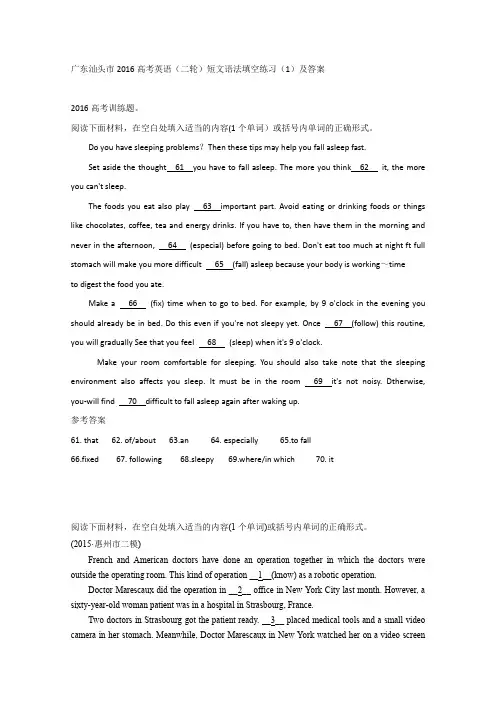
广东汕头市2016高考英语(二轮)短文语法填空练习(1)及答案2016高考训练题。
阅读下面材料,在空白处填入适当的内容(1个单词)或括号内单词的正确形式。
Do you have sleeping problems?Then these tips may help you fall asleep fast.Set aside the thought 61 you have to fall asleep. The more you think 62 it, the more you can't sleep.The foods you eat also play 63 important part. Avoid eating or drinking foods or things like chocolates, coffee, tea and energy drinks. If you have to, then have them in the morning and never in the afternoon, 64 (especial) before going to bed. Don't eat too much at night ft full stomach will make you more difficult 65 (fall) asleep because your body is working~timeto digest the food you ate.Make a 66 (fix) time when to go to bed. For example, by 9 o'clock in the evening you should already be in bed. Do this even if you're not sleepy yet. Once 67 (follow) this routine, you will gradually See that you feel 68 (sleep) when it's 9 o'clock.Make your room comfortable for sleeping. You should also take note that the sleeping environment also affects you sleep. It must be in the room 69 it's not noisy. Dtherwise, you-will find 70 difficult to fall asleep again after waking up.参考答案61. that 62. of/about 63.an 64. especially 65.to fall66.fixed 67. following 68.sleepy 69.where/in which 70. it阅读下面材料,在空白处填入适当的内容(1个单词)或括号内单词的正确形式。
绝密★启用前试卷类型:B 2016年汕头市普通高考第二次模拟考试试题英语本试卷共三部分,共8页,满分135分(120分×1.125)。
考试时间120分钟。
注意事项:1.本试卷分第Ⅰ卷(选择题)和第Ⅱ卷(非选择题)两部分。
答卷前,考生务必将自己的姓名、考生号、考场号和座位号填写在答题卡上。
因测试不考听力,第Ⅰ卷从第二部分的“阅读理解”开始,试题序号从“21”开始。
2.回答第Ⅰ卷时,选出每小题答案后,用铅笔把答题卡上对应题目的答案标号涂黑,如需改动,用橡皮擦干净后,再选涂其它答案标号,写在本试卷上无效。
3.回答第Ⅱ卷时,将答案写在答题卡上。
写在本试卷上无效。
4.考试结束后,将本试卷和答题卡一并交回。
第二部分:阅读理解(共两节,满分40分)第一节(共15小题;每小题2分,满分30分)阅读下列短文,从每题所给的四个选项(A、B、C和D )中,选出最佳选项并在答题卡上将该项涂黑。
ABill’s laptop stopped working. He looked in th e phone book under Computer Repair. He called a repair place near his apartment. Byron answered the phone. Bill said, “My laptop has crashed. Can you retrieve the files? If so, how much will it cost?” Byron said, “I charge $125 an hour. I can probably retr ieve the files in an hour. If I can’t, I will call you.”The conversation lasted a few more minutes. Bill was impressed. Byron was very polite. He seemed friendly. He seemed trustworthy. A little later, Bill took his computer to Byron’s office. Byron’s wife was his secretary. She was very friendly. All three talked about Bill’s computer, the weather, the Yankees, and the “good old days.”“They’re a really nice couple,” Bill thought as he left Byron’s office. “I think I have two new friends.”The next morning, Bill called Byron.“How’s it going?” Bill asked.“It’s coming along.” said Byron, “Your files are a real mess. I’ve spent 3.5 hours on your computer, but I haven’t retrieved everything.”“Excuse me?” Bill said, “What do you mean, 3.5 hours!? How much money is that? That’s $375!”Byron said, “Well, actually, it’s $437.50.”“$437.50!?” said Bill, “Is this a joke? I can buy a brand new computer for $437.50! You’re pulling my leg, right? We agreed to one hour. Then you were supposed to call me. Why didn’t you call me?”“It was late at night,” Byron said, “I didn’t want to wake you. Look, it sounds like you’re upset. I’ll take you off the clock right now. I’ll retrieve all your files, but just charge you for the first 3.5 hours. I still have about two hours to go. You’ll be getting those two hours for free. That’ll save you $250! How’s that for a deal?”21. How did Bill feel about the couple when he met them?A. openB. talkativeC. coldD. kind22. Why didn’t Byron call Bill?A. He wanted to earn more money.B. He didn’t want to disturb him.C. He forgot Bill’s phone number.D. He thought it was unnecessary.23. How much should Bill have paid for Byron?A. $ 375B. $ 250C. $437.5D. $687.5BThe high-profile case of a caregiver accused of killing an elderly woman in Guangdong province has exposed a management lapse (过失) in the senior care market, according to experts.He Tiandai, 45, admitted killing a 70-year-old woman she was taking care of by placing sleeping pills and chemicals in her soup. At a trial that started last week in Guangzhou, the capital of Guangdong, she said she killed her employer because she wanted to get her monthly pay in advance. She said the employer’s daughter-in-law, surnamed Liang, had promised to pay her monthly salary even if the elderly woman died before the end of a month. The caregiver also claimed to have killed another nine elderly people between June 2013 and December last year while looking after them separately. But she was not charged by prosecutors (公诉人) due to a lack of evidence.Guangzhou Intermediate People’s Court heard the case on Wednesday and has yet to give a verdict(裁决).Zhang Yiri, an associate professor of law at Guangzhou City Polytechnic, said the case indicates a lack of government supervision and management of agencies handling caregivers. “Many agencies hire them without any background checks. All they ask for is identity cards before they recommend them to local households,” Zhang said.Ma Xiaoyan, a lawyer at the Guangdong Code Law Firm, said companies recruiting caregivers should check the backgrounds of potential hires and their employment records. Ma urged such companies to work with public security departments and send information on caregivers to police for regular checks.24. Why did He Tiandai kill the old woman?A. She hated the old woman.B. She wanted to get her money beforehand.C. She was accused of killing.D. She was mad.25. How many people have been killed by He?A. 1B. 2C. 9D. 1026. According to Zhang Yiri, government should _____________.A. punish the company which hires He TiandaiB. set up laws to protect the oldC. oversee and manage the senior care marketD. check the background of the caregivers27. What did Ma Xiaoyan suggest?A. Agencies handling caregivers should cooperate with the police for checking the caregivers regularly.B. Agencies handling caregivers should monitor the caregivers regularly.C. Agencies handling caregivers should keep the caregivers’ identity cards for regular checks.D. Agencies handling caregivers should send information on caregivers to the owners.CIdema, a Dutch Sinologist (汉学家), has served as the director of the Chinese Languages and Cultures Department at Leiden University of the Netherlands and was also director of Harvard’s Fairbank Center for East Asian Research. He has studied ancient Chinese plays, novels and literature, and has authored or translated a number of influential books published in English and other languages.The 70-year-old Dutch Sinologist recalled his half-century-long romance with Chinese culture during a recent visit to Beijing. As a child, the vivid descriptions of China in Nobel and Pulitzer Prize-winner Pearl S. Buck’s books sparked Idema’s interest in the country. He later read classic Chinese literature and spent whole days pouring through works at the National Library of China.While many other experts on China focused on the countr y’s economic transformation, Idema continued to study traditional Chinese literature. “There were scholars studying law, religion and society, but not traditional Chinese literature, which was my personal interest,” Idem a explains.Finding reference books for his research, especially regional publications, used to be a huge challenge, and Idema used to spend a lot of time collecting books and other materials during visits to China. Now it is much more convenient with the Internet.Idema usually chooses less-known subjects for his research and tries to get firsthand materials. In recent years, he has devoted himself to translating Chinese folk tales and writing about Chinese folk society and folk culture.“Traditional Chine se culture is a passion. I have been studying it for 50 years and will continue to do so,” says the retired professor.28. Which of the following word is closest in meaning to “sparked” in the second paragraph?A. surprisedB. decreasedC. arousedD. glittered29. Why didn’t Idema focus on the same as the other experts?A. For his own purpose.B. For his own hobby.C. For his own uniqueness.D. For his own character.30. How can we describe Idema?A. crazyB. warm-heartedC. determinedD. intelligent31. What is the best title of the passage?A. The life of IdemaB. A passion for Chinese cultureC. Idema’s visit to ChinaD. The personal interestDFailing in something isn’t a really nice feeling, but Scotlan d’s Fettes College in Edinburgh wants to show its students that failure isn’t something to fear and is actually something to accept willingly!The boarding school held “failure week” this week to celebrate taking risks and learning from them. Whether in sports or school, children often face lots of pressure to succeed and do well, and the school was becoming concerned.“Young people from all walks of life live in a high-pressure environment where they are trying very hard to achieve a level of perfection,” said Sue Bruce, head of personal and social education at the school.“This week at Fettes we have been focusing on one of the most misunderstood parts of success: failure. While we are often scared of failure, it is important to learn that it is only through failing, often many times, that we learn how to succeed. All through the week, we have looked at the experiences of some of the most successful inventors, artists and businessmen, who failed hundreds, if not thousands, of times in their journey to success,” read a letter on Fettes College’s website.To celebrate failure, students were encouraged to try something they’ve never done before, like playing an instrument or dancing in front of audiences. A number of students stepped up and tried things that they finally failed in, but they had fun and enjoyed the experience. “The concert was extremely enjoyable, proving that we should always try not to worry about failure and have a go!”read another note on the website. Students were also taught about famous people like J.K. Rowling and Richard Branson who failed many times before they finished what they set out to do.“If they let the fear of failure stop them from doing something, they are actually stopping themselves from learning, developing, and potentially succeeding,” said Bruce.32. Why did the school hold “failure week”?A. To celebrate failure.B. To encourage students to risk.C. To make students defeat failure.D. To celebrate learning from trying something new33. To celebrate “failure week”, students can ________.A. hold a concertB. share their failure with othersC. do things they’ve hardly doneD. learn something about famous people34. What can we learn from the passage?A. Almost no one can avoid failure.B. All know that failure is part of success.C. Children only face lots of pressure to succeed in school.D. Students feel ashamed of dancing in front of audiences.35. What’s the purpose of this text?A. To show student s’ interest in failure.B. To describe some ways to defeat failure.C. To recommend how important it is to defeat failure.D. To report one successful way to accept failure.第二节(共5小题;每小题2分,满分10分)根据短文内容,从短文后的选项中选出能填入空白处的最佳选项。
广东汕头市2016高考英语(二轮)阅读理解练习(2)高考英语任务型阅读考前精讲精练(答案)阅读表达专题讲解命题规律分析阅读表达具有以下特点:1. 阅读表达相对于传统阅读理解题更具综合性和主观性,更注重考查考生在语言输入的基础上,进行语言输出的能力,要求考生在对阅读材料理解的基础上分析、概括、整理,并根据需要答题。
主要考查学生的综合语言运用能力,较好地体现了新课程标准的要求。
2. 重视“新材料,新情境”的创设与运用,是“用英语做事的体现”之一。
文章选材贴近生活,具有时代感,体裁以议论文和说明文为主。
文章还增加了段落编号,这不仅方便考生作答,而且方便老师阅卷,体现了试卷设计的人性化原则。
下面是2011至2013年阅读表达文章情况列表:题型探究与解题技巧江西阅读表达要求考生阅读一篇短文,并根据所给题目要求进行作答。
根据江西省英语科《考试说明》可知,其题目类型主要有以下几类:1. 短文信息列举题该题型相当于传统阅读理解题里的细节理解题。
解题时根据试题提供的信息,在文中寻找关键词,并根据需要,提取信息。
常见的命题形式有:① List the items of… ② List three factors of… ③ Find out the advantage of…等。
解题技巧:首先要信息定位,也就是快速准确地在文章中找到题目所涉及的相关内容,然后搜索关键词,通过语境来确定答案。
2. 确认指代关系该题型要求考生根据上下文,确定具有指代功能的词语所指代的内容。
主要考查that、it、this、they、 them、one等代词或文章中其他词语的指代关系。
常见的命题形式有:What does the word “it” probably refer to? (no more than 3 words)解题技巧:首先要返回原文,找出题目中的指代词;然后,向上搜索,找最近的名词或名词性短语(通常在本句或上句中);最后,将找到的词(短语)代入题句,替换指代词,看意思是否通顺。
2016高考英语二轮阅读理解练习(1)阅读理解------ARecognized as the largest desert in the world, the Sahara run s across North Africa, Covering over 3 million square miles fro m the Atlantic Coast to the . Except for an occasional oasis(绿洲), this vast land is mainly made up of sand, stones, and wor n out mountains. The burning sun causes daytime temperatur es to rise to 70 degrees in the shade, and days without rain c ommonly last for years.Paintings found on the walls of caves in the suggest that a fe w thousand years ago, large quantities of plants grew there a nd covered the desert floor. Many curious and unusual insect s, birds and animals got enough food that allowed them to gro w and reproduce. At that time, huge river systems and many oases supported growing communities(社团,社区) where a large number of people lived.Research scientists believe that the land became a desert for several reasons. For centuries people there have wandered fr om place to place in search of food, water and grazing(吃草)land for their animals. These people have always considered the number of animals they have as a sign of wealth. It is c onsidered more important to have 100 sick and starving anim als than 15 healthy ones. The large herds (群)have been allo wed to go freely and graze on desert plants and grass. Over ti me, large sections of land have been left uncovered. In additi on to allowing overgrazing, these people cut down whatever tr ees they could find and used them for firewood. The sand wa s unable to hold on to the great heat of the day, so nightting te mperatures often drop below freezing and nothing was left to hold the soil together.Scientists have been studying different ways to bring back the green desert. Through research and experiments, they hope to be able to produce plants that will once again support the lif e there. Huge holes filled with much water lie under the desert surface. Scientists believe this rainwater simply flew down thr ough the sand over hundreds of years and collected in the big , rocky holding tanks. By making use of the sun’s power, scie ntists in the Sahara have made experiments in which they got huge amount of electricity. This electricity was then used to o perate drilling machines and pumps to pull the rainwater from the underground tanks. By drilling the hole one mile deep into the floor of the desert, one machine was able to recover more than 80 gallons of ice—cold water each second, or 288,000 gallons per hour. Scientists have had some success turning this wasteland into useful farmland. Today the desert is dotted with huge wheat fi elds watered by a system of pipes that carry water from the u nderground tanks. Farmers have also learnt that plants grow better if seeds are planted next to stones. Studies show that s tones provide protection from the sun, allowing seeds to grow in a shady and cool environment. In addition to that, greenhou ses have been built to protect plants from the sunshine so tha t less water is needed. Another idea is to grow plants that can live on a diet of salt water, since the ocean is so near to the d esert.1. What will probably happen if the local people continue their customs and traditions?A. The desert will continue to be enlarged.B. Tourists will begin traveling to North Africa.C. More oases will begin to appear across the desert.D. The number of healthy animals will become larger.答案解析:答案为A。
2016高考英语阅读理解二轮基础训练80集连载(1)阅读理解。
阅读下列四篇短文,从每小题后所给的A,B,C或D 四个选项中,选出最佳选项。
About ten men in every hundred suffer from color blindness in some way. Women are luckier,only about one in two hundred is affected in this matter. Perha ps,after all,it is safer to be driven by a woman.There are different forms of color blindness. In some cases a man may not be able to see deep red. He may think that red ,orange and yellow are all shades of green. Sometimes a pers on cannot tell the difference between blue and green. In rare cases an unlucky man see everything in shades of green—a strange world indeed.Color blindness in human beings is a strange thing to explain. In a single eye there are millions of very small things called “c ones”.These help us see in a bright day and tell the differen ce between colors. There are also millions of “rods”, but the se are used for seeing when it is nearly dark. They show us s hape but no color. Some insects have favorite colors. Mosquitoes(蚊子) like blue but do not like yellow. A red light will not attract in sects,but a blue lamp will. In a similar way human beings also have favorite colors. Yet we are lucky. With the aid of the cones in our eyes we can see many beautiful colors by day,and with the aid of the rods we can see shapes at night. One day we may even learn more about the invisible colors around us.1. This passage is mainly about ________.A. color and its surprising effectsB. women being luc kier than menC. danger caused by color blindnessD. color blind ness2. According to the passage,with the help of the “cones”,we can ________.A. tell different colorsB. see in weak lightC. tell different shapesD. tell orange from yell ow3. Why do some people say it is safer to be driven by women ?A. Women are more careful.B. There are fewercolorblind women.C. Women are fonder of driving than men.D. Women are weaker but quicker in thinking.【参考答案】1—3、D A B2016高考模拟题。
广东汕头市2016高考英语(二轮)阅读理解练习(4)高考英语任务型阅读考前精讲精练(答案)阅读表达考纲解读及解题指导高考阅读表达把阅读和写作巧妙结合,是一种主客观题相结合的题型,旨在全方位、多角度考查学生的阅读、思维和语言表达能力。
本题型具有以下特点:一、问题设置形式灵活多样,综合考查学生的多种基本能力。
命题涉及标题归纳、意图判断、代词指代、补全内容、问题简答以及结论等,形成对文章全方位、多角度的考查,能全面、客观地反映学生“读、写、思、译”等方面的能力。
二、答题客观性和开放性相结合,突出思维的开放性,给学生提供广阔的思维空间。
要求考生根据短文内容和自己的理解作答,只要符合题目要求,表述准确,就是正确答案。
考生可以充分展示自己的语言表达能力,发挥思维的多样性与开放性。
三、选材要求文章结构严谨,层次分明,信息量大,包含结构复杂的难句,适合命题的多样性。
所选文章一般是一篇具有中等难度的说明文、议论文或应用文。
解题指导下面对阅读表达的命题规律做一探讨,希望对大家备战2014年高考有所帮助。
一、主旨归纳。
这种问题要求在把握好全文或某一段内容的基础上,对文章(或段落)的主旨大意进行归纳。
常用的命题方式有:What is the text mainly about? (no more than x words)What is mainly discussed in the text? (no more than x words)What advice is given in the …paragraph? (no more than x words)大家在进行主旨归纳时,应该首先看一看文章首尾段是否对全文进行了归纳,如果这样,我们通过归纳文章首尾段就能得到文章的主旨;如果上述两种情况都不存在,我们就需要对全文进行归纳总结。
在归纳文章主旨时,一定要注意扣准能够体现文章主旨的关键词。
二、标题归纳。
这种题型非常类似于阅读理解中的标题选择题,即要求考生在整体把握全文的基础上,用最简洁凝练的语言归纳文章的标题。
广东汕头市2016高考英语(二轮)阅读理解练习(1)高考英语阅读理解考前精讲精练(答案)阅读理解解题指导阅读理解历来都是高考英语试卷中难度最大、区分度最高的题型,它要求考生理解文章的主旨和要义;理解文中的具体信息;根据上下文推断生词的词义;理解文章的基本结构;理解作者的意图、观点和态度等。
下面我们来探讨一下高考阅读理解的解题思路。
一、主旨大意题此类题型主要考查考生的归纳、概括等能力。
一种命题方式是对整篇文章或者某一段落大意的概括,提问方式一般是:What is the text mainly about?/What is the main idea of the text/ the second paragraph?;另一种命题方式是提炼文章的标题,其提问方式一般是:What can be the best title for the text?阅读时,文章的开头、结尾及段落的段首句和段尾句特别重要,因为它们往往包含文章的中心议题。
有时候,文章或段落中没有明确的主题句,需要我们根据所提供的信息归纳出文章或段落的主旨大意。
同时要注意提炼文章的关键词。
此外,标题类题目还要追求语言的生动和趣味性。
如:(2013 江苏卷B篇)We’ve considered several ways of paying to cut in line: hiring line standers, buying tickets from scalpers (票贩子), or purchasing line-cutting privileges directly from, say, an airline or an amusement park. Each of these deals replaces the morals of the queue (waiting your turn) with the morals of the market (paying a price for faster service).60. The passage is meant to .A. justify paying for faster servicesB. discuss the morals of allocating thingsC. analyze the reason for standing in lineD. criticize the behavior of queue jumping解析:文章主要阐述了两种不同的分配方式,即传统的waiting for your turn和市场竞争中出现的paying a price for faster service。
第一段引出本文话题,揭示文章主题。
(2013安徽卷B篇)Using too much water or throwing rubbish into our rivers are clear ways that humans can put our water supply in danger, but we also affect our water supply in less obvious ways. You may wonder how paving (铺砌) a road can lead to less useable fresh water.A major part of the water we use every day is groundwater. Groundwater does not come from lakes or rivers. It comes from underground. The more roads and parking lots we pave, the less water can flow into the ground to become groundwater.63. The text is mainly about ______.A. why paving roads reduces our waterB. how much we depend on water to liveC. why droughts occur more in dry climatesD. how human activity affects our water supply解析:文章主要介绍了由于一些不合理的人类活动,导致了水资源的短缺,呼吁大家从我做起,从小事做起来保护水资源。
文章的第一句就揭示了文章的主题:人类活动影响着水资源的供应。
(2013天津卷C篇)Poet William Stafford once said that we are defined more by the detours (绕行路) in life than by the narrow road toward goals. I like this image. But it was quite by accident that I discovered the deep meaning of his words.50. What could be the best title for the passage?A. Charm of the DetourB. The Road to BraveryC. Creativity out of NecessityD. Road Trip and Country Life解析:作者以诗人William Stafford对绕行道的理解引题,加上自己的亲身经历,进一步理解了绕行道更深刻的意义——它会让你发现旅行中最好的部分,也发现最好的自己。
由此我们概括出文章的标题:绕路的魅力。
二、细节理解题细节理解题主要考查考生对阅读材料中某一特定细节或文章的主要事实的理解能力。
它的设题方式主要有以下两种:1. 以what, who, which, when, where, why, how等特殊疑问句的方式来提问,针对文章中的具体事物、人物、时间、地点、原因(目的)、方式等来设问考查。
解这类题时,大家可以带着问题去阅读文章,最后采用“对号入座”的办法,把原文信息跟后面的题目对照,最后确定出正确答案。
如:(2013江苏卷D篇)I say clever because anti-slavery fiction had been the important part of the literature in the years before the Civil War. H. B. Stowe’s Uncle Tom’s Cabin is only the most famous example. These early stories dealt directly with slavery. With minor exceptions, Twain planted his attacks on slavery and prejudice into tales that were on the surface about something else entirely. He drew his readers into the argument by drawing them into the story.65. How do Twain’s novels on slavery differ from Stowe’s?A. Twain was more willing to deal with racism.B. Twain’s attack on racism was much less open.C. Twain’s themes seemed to agree with plots.D. Twain was openly concerned with racism.解析:根据文中信息,Stowe的小说正面抨击奴隶制问题,而马克•吐温则通过故事来抨击奴隶制和种族歧视,可见马克•吐温对种族歧视的抨击不那么公开。
(2013课标卷I A篇)Some people will do just about anything to save money. And I am one of them. Take my family’s last vacation. It was my six-year-old son’s winter break from school, and we were heading home form Fort Lauderdale after a weeklong trip. The flight was overbooked, and Delta, the airline, offered us $400 per person in credits to give up our seats and leave the next day. I had meetings in New York, so I had to get back. But t hat didn’t mean my husband and my son couldn’t stay. I took my nine-month-old and took off for home.56. Why did Delta give the author’s family credits?A. They took a later flight.B. They had early bookings.C. Their flight had been delayed.D. Their flight had been cancelled.解析:本文为夹叙夹议文。
作者通过讲述自己的亲身经历来阐明观点,即如何获取金钱的最大利用价值,从而理性消费。
利用关键词查询可以在第一段中找到The flight was overbooked, and Delta, the airline, offered us $400 per person in credits to give up our seats and leave the next day这些相关信息。
由该句可知,因为航班超员,航空公司(Delta)以信用卡的形式补偿我们每人400美金,要我们放弃座位,第二天再离开。
故选A项(他们乘坐了较晚的航班)。
2. 以不完整的句子形式,针对文章的某个细节设题,考查考生对此事实细节的认定和理解能力。